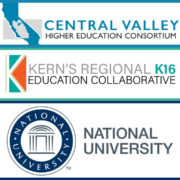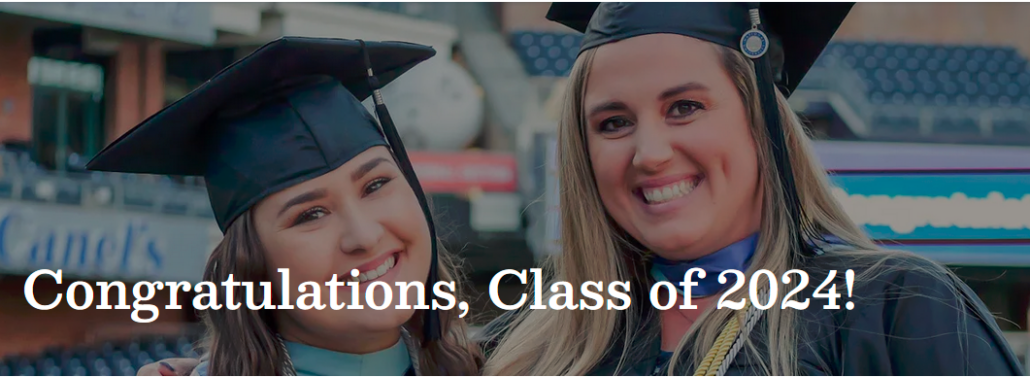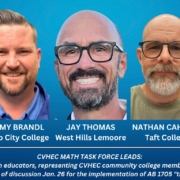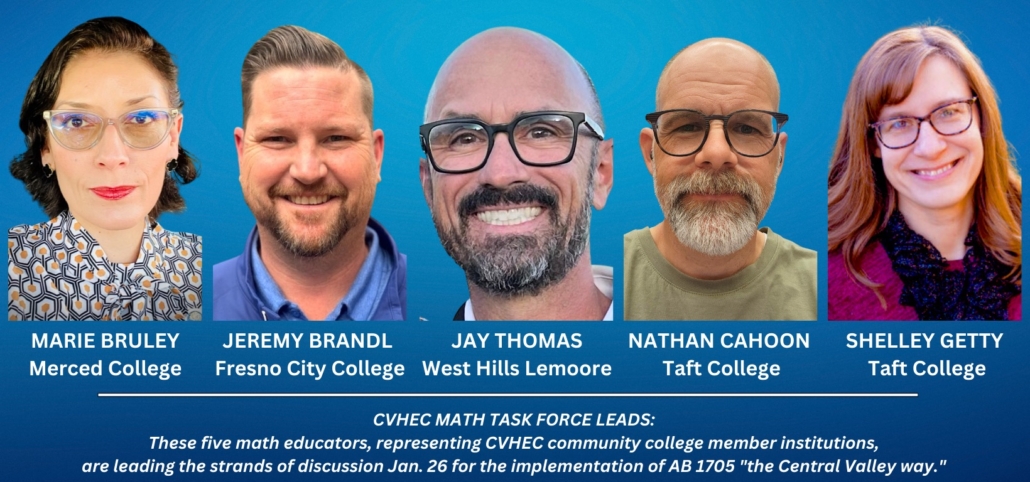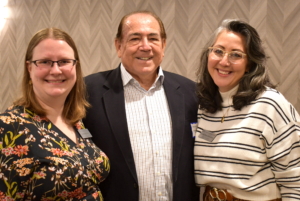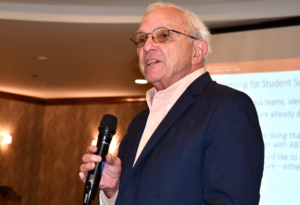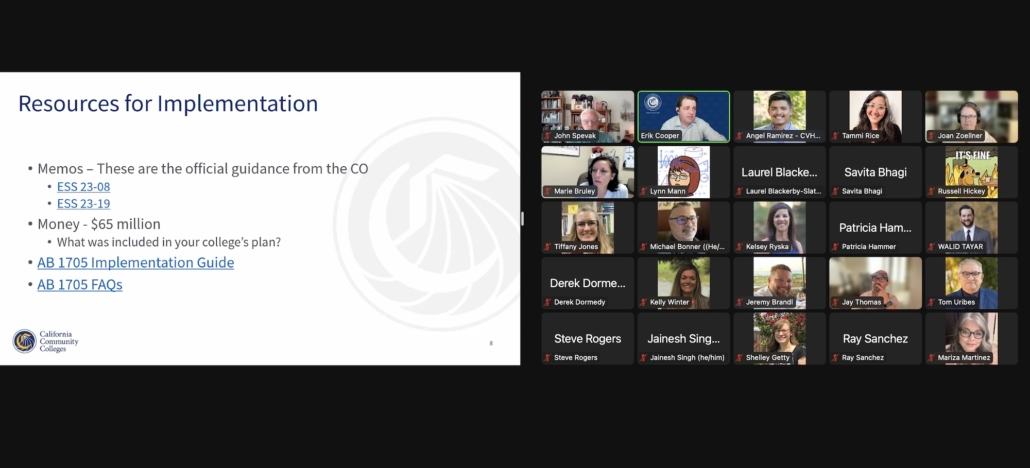Two cohorts from the Kern Master’s Upskilling Program (MA English) are eligible to participate and walk in the 2024 National University Commencement May 18 at Petco Park in San Diego. The program’s high school teacher participants are now qualified to teach English dual enrollment community college courses on their respective campuses. A third English cohort and the first Kern math cohort graduate in June.
Kern Master’s Upskilling Program
reaches another milestone
Second English cohort graduation – recruitment underway for a fall math cohort
The Kern Master’s Upskilling Program for high school teachers seeking a master’s degree in English or Math that qualifies them to teach dual enrollment courses at their respective campuses reached its second milestone last month when 11 participants completed post-baccalaureate requirements in English through National University.
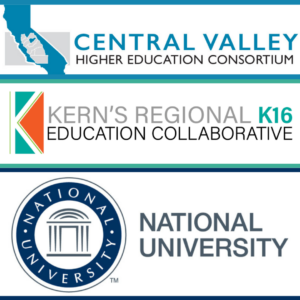 Formally known as the Dual Enrollment Teacher Upskilling Pathway for English and Mathematics, the Central Valley Higher Education Consortium initiative is in partnership with the Kern Regional K-16 Education Collaborative that was funded as part of an $18 million statewide competitive grant in June 2022 to improve student progress from high school to postsecondary education and ultimately into the workforce.
Formally known as the Dual Enrollment Teacher Upskilling Pathway for English and Mathematics, the Central Valley Higher Education Consortium initiative is in partnership with the Kern Regional K-16 Education Collaborative that was funded as part of an $18 million statewide competitive grant in June 2022 to improve student progress from high school to postsecondary education and ultimately into the workforce.
The program also announced recruitment is underway for a third math cohort of 21 students to begin this fall for completion in spring 2026 though Fresno Pacific University in concert with the Kern County Superintendent of Schools (KCSOS), which serves as the administrative agent for the Kern K-16 Collaborative.
Informational meetings are set for March 21 and April 11 at 4:30 p.m.
A potential fourth English cohort pilot through CSU, Bakersfield with seven students is also in the works said Tom Burke, CVHEC’s Kern Masters Upskilling Program lead who reports that the program progress “has been very good” since it was funded two years ago.
“With the first two cohorts of English graduates to be joined by our first cohort of math graduates this summer, we are well on the way to significantly increasing the number of faculty in Kern County eligible to teach dual enrollment or community college courses in math and English,” Burke said.
The January graduation follows the first cohort of 11 English students who graduated in September for the innovative state-funded CVHEC initiative that helps reduce the cost of tuition for high school teachers to pursue a master’s degree, a state requirement to teach community college dual enrollment courses.
Each NU cohort group of students is eligible to participate and walk in the 2024 Commencement services set for Saturday, May 18, at Petco Park in San Diego, said Jessica Gladney, senior director for Partnership Development/ Workforce Education Solutions for National University,
The first Kern Master’s Upskilling Program cohort — MA, English with a specialization in Rhetoric — began in January 2023 with 13 out of 15 students completing their program in November 2023 (nine of the 13 will graduate with honors with a grade point average of 3.85 and above).
The two remaining students are currently in the process of completing their capstone, which is the culminating course of the master’s program, Gladney said.
The second Kern Master’s Upskilling Program cohort of MA, English with a specialization in Rhetoric, began in March 2023, and 10 out of 15 students completed their program in January 2024. The remaining students are currently in the process of completing their capstone course, Gladney reports.
She said each NU cohort group of students is eligible to participate and walk in the 2024 Commencement services set for Saturday, May 18, at Petco Park in San Diego.
“We are proud of these candidates and we are excited to assist with building a qualified candidate pool of eligible dual-enrollment English teachers to meet the workforce demands in the Central Valley,” Gladney said.
CVHEC, made up of 28 institutions of higher education in the valley’s nine-county region from San Joaquin to Kern counties, is one of several partners in the Kern Collaborative.
South Valley CVHEC members include California State University, Bakersfield; Kern Community College District; Bakersfield College; Cerro Coso College; Taft College; Porterville College; Fresno Pacific University; and National University.
The project also includes the CVHEC Mentor Program that pairs the master’s candidates with a community college mentor to support them along the way and help them navigate the process to becoming an adjunct community college faculty member.
Under coordinators Dr. Liz Rozell (math) and Dr. Vikash Lakhani (English), the program is still accepting community college professors to serve as mentors, Burke said.
For more details about the fall 2024 math cohort through Fresno Pacific, potential students can contact:
- Manjula Joseph, program director – manjula.joseph@fresno.edu or 559.453.2096
- Nathan Lyness, senior Outreach & Admissions representative – nathan.lyness@fresno.edu or 559.453.7183
See:
- CVHEC Teacher Upskilling Program for Master’s Degrees Supports Dual Enrollment in South Valley via Kern K-16 Collaborative Grant (June 23, 2022)
- Rozell, Lakhani Named CVHEC’s Kern Faculty Mentor Coordinators (February 22, 2023)
- CVHEC IN THE NEWS: KBAK features Kern Master’s Upskill Program (November 17, 2022)
- Tom Burke Named Kern Master’s Upskill Lead (November 16, 2022)
- Herrera to Head Kern Regional K-16 Education Collaborative (July 13, 2022)
- KCSOS Mary Barlow Announces $18.1M Workforce Grant (KCSOS press release – June 9, 2022)
- “Blurring the Lines Between High School and College: Dual Enrollment in the Central Valley”(CVHEC video – March 2022)

